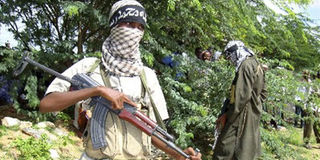Somali Islamists warn over closer US ties

Islamist Al-Shabaab fighters patrol on the outskirts of Mogadishu
MOGADISHU, Sunday
Sheikh Hassan Dahir Aweys, the leader of Hizbu Islam, one of the Islamist groups opposing the Transitional Federal Government has condemned the close ties between the Somali government and United States.
In a statement signed by Sheikh Aweys, the movement labelled the meeting between President Sheikh Sharif Sheikh Ahmed and US Secretary of State Hillary Clinton, in Nairobi on Thursday as hostile action against the people of Somalia.
“In the past, the US supported freedom fighters, but its recent policies have followed imperialistic approach,” said the Hizbu Islam. “Its strategy on Somalia is one based on adversary and chaos creation,” it added.
Sheikh Aweys indicated that Somalis hoped that the new US Administration with Barak Obama at the helm would pursue policies different from that of its predecessor (headed by George W. Bush). Instead, the Islamist movement views the US as aiming at furthering International colonial patterns.
Hizbu Islam accused the US government of having supported Ethiopia in its intervention in Somalia during 2007 and 2008. It said that Ethiopia still maintains forces inside Somali territory with the full support of the US.
In the aftermath of the meeting, President Sheikh Sharif and Clinton accused Eritrea of having negative impact on the stability of Somalia.
The US advised the Eritrean government to desist supporting the forces opposing the TFG, including Al-Shabaab.
Sheikh Aweys returned from exile in Asmara, Eritrea in April this year. His movement and Al-Shabaab are committed to overthrowing the government that was formed in January 2009 when moderate Islamists and secular politicians joined in a government of national unity.
Eritrea and Ethiopia are believed to be involved in proxy war in Somalia.
Meanwhile, gunbattles between clan militiamen killed at least 17 people and wounded 30 on Saturday at a pirate stronghold on the coast of Somalia, witnesses said.
Local man Farah Aden told Reuters by satellite telephone that the fighting began overnight and became heavier in the morning.




